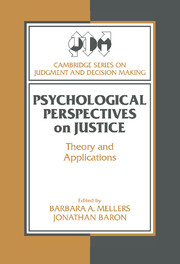Book contents
- Frontmatter
- Contents
- Series preface
- Contributors
- Part I Introduction
- Part II Psychological perspectives
- Equality as a decision heuristic
- Two insights occasioned by attempts to pin down the equity formula
- Judgments of distributive justice
- Part III Economic perspectives
- Part IV Variations in perspectives on justice
- Part V Policy perspectives
- Part VI Conclusion
- Name index
- Subject index
Equality as a decision heuristic
Published online by Cambridge University Press: 24 October 2009
- Frontmatter
- Contents
- Series preface
- Contributors
- Part I Introduction
- Part II Psychological perspectives
- Equality as a decision heuristic
- Two insights occasioned by attempts to pin down the equity formula
- Judgments of distributive justice
- Part III Economic perspectives
- Part IV Variations in perspectives on justice
- Part V Policy perspectives
- Part VI Conclusion
- Name index
- Subject index
Summary
Introduction
In this chapter I propose to examine the concept of equality or equal division as a heuristic that is used to facilitate decision making in situations involving the allocation of goods and bads. The kinds of situations that I have in mind involve two or more people who must share resources, responsibilities, or liabilities. This is the same class of situations about which much has been written from the point of view of ethical theories of distributive justice (e.g., Nozick, 1947; Rawls, 1971) and from the psychological perspective of equity theory (Adams, 1965; Messick & Cook, 1983; Walster, Berscheid, & Walster, 1973). This chapter does not deal with ethical issues per se and it pertains to equity theory and related concepts only insofar as equity theory is viewed as the outcome or product of a certain type of social decision making. The focus of the chapter is the individual cognitive processes involved when a person must make a decision about how some resource or cost should be allocated. I propose that the idea of equality has properties that make it a useful guideline or benchmark in making allocation decisions. It will become obvious that the use of equality as a decision heuristic does not imply that such decisions are simpleminded or uninteresting. On the contrary, they can be quite intricate.
- Type
- Chapter
- Information
- Psychological Perspectives on JusticeTheory and Applications, pp. 11 - 31Publisher: Cambridge University PressPrint publication year: 1993
- 146
- Cited by



